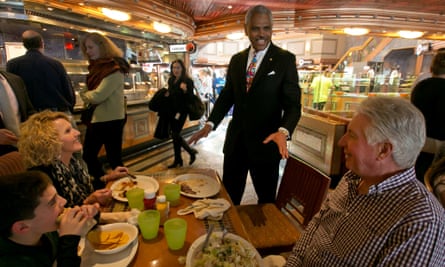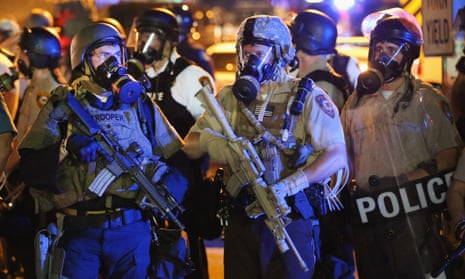If you choose, you can look at the dramatic events that have unfolded in Ferguson, Missouri as having nothing to do with economics.
In many ways, you would be right. It’s the tragedy of a young man whose life was cut short in a hail of bullets fired by a police officer, set in the broader context of a centuries-old tragedy of a country that either can’t or won’t find a way to look squarely at the legacy of its history as a slave-owning society. It’s a legacy that endures in a horrifying litany of violence. On a purely personal level, I can’t get past my conviction that had Michael Brown been white, living in a suburban community, he’d be alive today, and probably with not even a bruised wrist to show for his experiences.
Economics can’t explain why a white cop will give the benefit of the doubt to a white teenager and automatically view a young black man in a hoodie with suspicion, even if all the latter is doing is ambling down the street. But economics does help explain why those cops are disproportionately white and likely to make those racially-biased judgments. And why communities in which this and the too many other similar other episodes occur subsequently erupt in outrage.
Missouri may be one of the most racist states in the country, as a Ferguson community activist claimed, pointing to racial profiling by the police and the struggle to find jobs.
But economic injustice and inequality simply institutionalizes those attitudes on the part of the white population, and creates frustration and anger on the part of the African American community. What we’re witnessing today is the inevitable outcome of economic injustice.
And while these issues are significantly more acute in the way they affect African Americans, whether in Ferguson, Missouri or the United States, we may want to ponder what they mean for economically disadvantaged communities as a whole.

Racial differences also mean economic disparities
Some facts to ponder. About 80% of American high school students now receive their diplomas on time (within four years); for African Americans, the figure is only 69%.
College graduation rates for black men are only slightly more than half the rate for all students, although black women fare better. African Americans make up 11% of the workforce, but 14% of those earning only minimum wage.
According to the 2012 US census, African Americans represent 14.2% of the population nationwide, but 28.1% of this group lives in poverty – compared to 11.1% of the total population. Of families with children, that number jumps to a third, compared to 18.8% of families of all races. Unemployment, whether short or long-term, runs at double the rate that white workers experience. If you’re black, you’re significantly more likely to have to spend more than 30% of your monthly income on either rent or monthly occupancy costs.
What all this adds up to, in the long run, is a crippling disadvantage – a yawning wealth gap between the races. One study shows that while a white family turns every $1 of income into $5 of wealth, for the typical African American family that $1 translates into a mere 69 cents of wealth. White Americans make up 64% of the country’s population, but own 88% of its wealth; today’s typical white household is likely to be 20 times more affluent than its black counterpart. As long as that remains the case, the white economic elite perpetuates itself, and continues to make the rules – deciding, for instance, what the criteria are for hiring cops in Ferguson.
This is the most dramatic and most visible subset of the national wealth gap: the wealth gap that prompted billionaire Nick Hanauer, an early investor in Amazon, to speak out publicly earlier this summer in a column for Politico, telling his fellow plutocrats that they were living in a dream world, and pointing to the Arab spring and the French and Russian revolutions as salutary lessons to bear in mind:
Revolutions … come gradually, and then suddenly. One day, somebody sets himself on fire, then thousands of people are in the streets, and before you know it, the country is burning.
And it will be too late for Hanauer and his buddies to sprint for their Gulfstreams and zoom off to New Zealand. The pitchforks will bar the way.
There are alternatives. History has demonstrated – if only in its exceptions – that racism doesn’t need to triumph. Paving the way for economic opportunities enables individuals to transcend and even defy the racist environments in which they grew up.

How to create success that doesn’t discriminate by race
Last week, for instance, I spent an hour on the phone with Arnold Donald, CEO of Carnival Corp, the cruise line company that owns more ships than any other entity than the US and Russian navies.
Donald was born in the Ninth Ward of New Orleans to parents who had only grade school educations, in the mid-1950s, when Jim Crow laws held the South in their grip.
We didn’t discuss the events in Ferguson, which had happened just a day or two earlier.
We did talk about what had enabled him to break past that environment, knowing that even when his parents willed him to succeed, the society in which he lived likely saw him as just another black kid who was likely to follow the statistically probable path.
“My high school brainwashed us,” says Donald about St Augustine, the prestigious high school run by the Catholic Josephite Brothers. “They drilled it into us that we could be anything we wanted to, and because they prepared us to compete on a level playing field – in debates, in sports. It never crossed our minds to doubt them.” Donald credits that confidence for helping him climb the corporate ladder to the CEO suite.
That’s one economic success story – and there are many others. What we can’t do, of course, is to point to those individuals and to say that because they succeed – because we have elected a black man as the country’s president, because African Americans occupy White House posts and one sits on the supreme court – then there is no problem, or that the problem isn’t a systemic one.
Clearly, both the data and the everyday lives of African Americans in Ferguson and far too many other communities demonstrate that this isn’t the case. And it is probably one that economic advancement – the closing of that wealth gap – alone won’t solve completely. I doubt that members of any affluent black family are unfamiliar with the problem of “DWB”, or “driving while black”.
On the other hand, the less that African American families have to struggle for the basics of life – to stay above the poverty line, to educate their children – the better positioned they’ll be to grab and wield the share of political and economic power to which they are entitled by birth – by virtue of the fact that they’re citizens of the United States.
